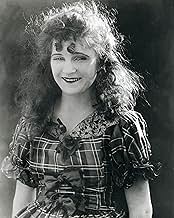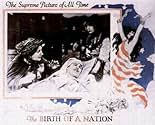La famiglia Stoneman vede incrinarsi l'amicizia con i Cameron durante la guerra di secessione, in cui le due famiglie lottano in fazioni opposte. Gli sviluppi della guerra nell'arco delle lo... Leggi tuttoLa famiglia Stoneman vede incrinarsi l'amicizia con i Cameron durante la guerra di secessione, in cui le due famiglie lottano in fazioni opposte. Gli sviluppi della guerra nell'arco delle loro vite portano all'assassinio di Lincoln e alla nascita del Ku Klux Klan.La famiglia Stoneman vede incrinarsi l'amicizia con i Cameron durante la guerra di secessione, in cui le due famiglie lottano in fazioni opposte. Gli sviluppi della guerra nell'arco delle loro vite portano all'assassinio di Lincoln e alla nascita del Ku Klux Klan.
- Regia
- Sceneggiatura
- Star
- Premi
- 2 vittorie totali
- Col. Ben Cameron aka The Little Colonel
- (as Henry Walthall)
- Silas Lynch - Mulatto Lieut. Governor
- (as George Seigmann)
- Jeff - The Blacksmith
- (as Wallace Reed)
- Abraham Lincoln
- (as Jos. Henabery)
- Wade Cameron - The Second Son
- (as J.A. Beringer)
- Duke Cameron - The Youngest Son
- (as John French)
Recensioni in evidenza
Anyone who ever complains about the political correctness or historical "revisionism" of today's academics, see this movie. And understand, that it is the work of historical "revisionists" that are responsible for teaching the facts about our nation's history, grasped out of the hands of fictions like Griffith's horrific Birth of a Nation. And don't be so smug about complaining of political correctness in the future.
And don't try to seperate this film as an artistic work with the historical perspective of the film. Keep in mind, this film was not only a portrayl of history, it was also a *part* of history. It served to defend racial segregation, lychings, and the Klan at a time when all three of those were very real political issues. It is not a coincidence that the greatest period of lychings and Jim Crow laws came shortly after this movie. In short, this film oppressed people. So don't treat it like it existed in an entertainment vacuum, unaffected by and unaffecting everything else around it.
This movie is not anti-Union, it is not pro-Antebellum south. It is anti-Black. The movie frames the ending of slavery as the beginning of the end for civilized society in the south, brought about by a conspiracy of carpet-baggers and scheming mulattos and blacks. The answers to this issue are redemptive violence by the Klu Klux Klan and a return to the master-servant relationship of slavery. The movie frames "the loyal soul" blacks who accepted their ownership and didn't want slavery to end as the redeemable memebers, while those that welcomed the end of slavery did so entirely to then turn that systemic violence back against the whites.
I genuinely do not believe that you can understand how malicious and hateful this movie is if you haven't seen it. One can have it described to them, one can know the individual scenes of hatred within, but until one has experienced the slow, pernicious leaking of racial hatred firsthand, it can't sink in how contemptible this movie is.
Technically important? Yes, nobody is denying that. Even as the movie's message becomes more and more evil, it is shot with a competency and ambition that it would take the rest of the industry decades to catch up to. It is worthy of preservation in that regard. But it is also entirely indicitave of the era that a movie which makes such strides (and was the first film to see great success in America and be played in the white house) is a movie which frames the idea of a white man being expected to shake a black man's hand as an indignity which exceeds lynchings and enslavement.
One of the posters remarked on how ridiculous the Klansmen's hoods looked. Actually, the original "ghost costumes" were all homemade and there was no standardized uniform- some had spikes on the head, horns, painted faces on the masks, etc.
I myself had an ancestor who was a member of the Reconstruction Ku Klux Klan, and they saw themselves as guerilla fighters against an occupying power, not as terrorists. Today we can condemn them. At the time, it must have seemed to them that the war was over, but that the battle lines were still firmly drawn.
This film is a good peek into the attitude of the general public in 1915 about Reconstruction. It became a national obsession, and probably gave impetus to Col. William Joseph Simmons's decision to "resurrect" the Klan in that year.
Lo sapevi?
- QuizPresident Woodrow Wilson is famously rumored to have responded to the film with the remark: "It is like writing history with lightning. And my only regret is that it is all so terribly true." After the film became subject of controversy due to its heroic portrayal of the Ku Klux Klan, Wilson denied through his press secretary as to having known about the nature of the film before screening it at the White House, or having ever endorsed it. Nevertheless, Wilson's published works as a historian are closely aligned with the film's negative portrayal of Reconstruction (some of his writings are even quoted onscreen in certain prints of the film). Wilson was also notably a consistent pro-segregationist as President.
- BlooperThe Ku Klux Klan never fought or won any battles with federal troops, black or white.
- Citazioni
intertitle: While youth dances the night away, childhood and old age slumber.
- Curiosità sui creditiThe following was listed in the opening credits: A PLEA FOR THE ART OF THE MOTION PICTURE We do not fear censorship, for we have no wish to offend with improprieties or obscenities, but we do demand, as a right, the liberty to show the dark side of wrong, that we may illuminate the bright side of virtue--the same liberty that is conceded to the art of the written word--that art to which we owe the Bible and the works of Shakespeare.
- Versioni alternativeIn both 1921 and 1927, edited versions of the film were released to reflect current political viewpoints.
- ConnessioniEdited into The Revenge of Pancho Villa (1932)
I più visti
Dettagli
Botteghino
- Budget
- 110.000 USD (previsto)
- Tempo di esecuzione
- 3h 15min(195 min)
- Mix di suoni
- Proporzioni
- 1.33 : 1

































